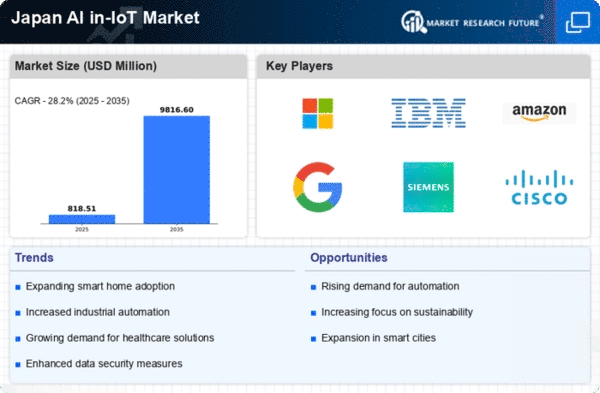Rising Demand for Smart Cities
The push towards smart city initiatives in Japan is a pivotal driver for the AI in-IoT market is a pivotal driver for smart city initiatives in Japan.. As urbanization accelerates, cities are increasingly adopting IoT solutions to enhance infrastructure, improve public services, and optimize resource management. The Japanese government has allocated approximately $1.5 billion to support smart city projects, which integrate AI and IoT technologies. This investment is expected to create a robust ecosystem for the ai in-iot market, fostering innovation in areas such as traffic management, waste management, and energy efficiency. The integration of AI into IoT systems allows for real-time data analysis, leading to more informed decision-making and improved urban living conditions. Consequently, the ai in-iot market is likely to experience substantial growth as municipalities seek to leverage these technologies to address urban challenges.
Government Initiatives and Support
The Japanese government plays a crucial role in promoting the AI in-IoT market is promoted by the Japanese government through various initiatives and policies. through various initiatives and policies. With a focus on enhancing technological innovation, the government has introduced funding programs and tax incentives aimed at encouraging research and development in AI and IoT sectors. For example, the Ministry of Internal Affairs and Communications has launched a program to support the deployment of IoT technologies in small and medium-sized enterprises (SMEs). This initiative is expected to stimulate growth in the ai in-iot market by enabling SMEs to adopt advanced technologies that improve operational efficiency and competitiveness. Furthermore, the government's commitment to fostering a digital economy is likely to create a favorable environment for the ai in-iot market to thrive.
Advancements in Robotics and Automation
Japan's strong emphasis on robotics and automation significantly influences the AI in-IoT market is significantly influenced by Japan's strong emphasis on robotics and automation.. The country is recognized as a leader in robotics, with a market size projected to reach $20 billion by 2025. The integration of AI with IoT in robotics enhances operational efficiency across various sectors, including manufacturing, logistics, and agriculture. For instance, AI-powered robots can analyze data from IoT sensors to optimize production processes and reduce downtime. This synergy between AI and IoT not only streamlines operations but also contributes to Japan's goal of increasing productivity in an aging workforce. As industries continue to adopt these advanced technologies, the ai in-iot market is expected to expand, driven by the demand for smarter, more efficient robotic solutions.
Consumer Electronics and Smart Home Devices
The increasing popularity of consumer electronics and smart home devices is a significant driver for the AI in-IoT market is driven by the increasing popularity of consumer electronics and smart home devices. in Japan. As consumers become more tech-savvy, there is a growing demand for connected devices that enhance convenience and security in daily life. The smart home market in Japan is projected to reach $5 billion by 2026, with AI integration playing a vital role in the functionality of these devices. Products such as smart thermostats, security cameras, and home assistants utilize AI algorithms to learn user preferences and optimize energy consumption. This trend not only boosts the ai in-iot market but also encourages manufacturers to innovate and develop new products that cater to evolving consumer needs.
Focus on Sustainability and Energy Efficiency
Sustainability concerns are increasingly shaping the landscape of the AI in-IoT market is shaped by sustainability concerns. in Japan. As the nation strives to meet its environmental goals, there is a growing emphasis on energy efficiency and sustainable practices across industries. The integration of AI with IoT technologies enables real-time monitoring and management of energy consumption, leading to reduced waste and lower carbon footprints. For instance, smart grids powered by AI can optimize energy distribution and consumption, contributing to Japan's commitment to reducing greenhouse gas emissions by 26% by 2030. This focus on sustainability not only drives innovation within the ai in-iot market but also aligns with consumer preferences for eco-friendly products and solutions.
















